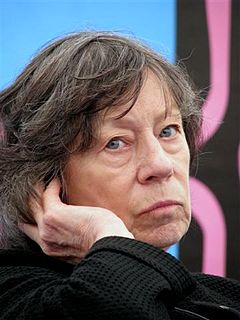Related Research Articles
Feminist film theory is a theoretical film criticism derived from feminist politics and feminist theory influenced by Second Wave Feminism and brought about around the 1970s in the United States. With the advancements in film throughout the years feminist film theory has developed and changed to analyse the current ways of film and also go back to analyse films past. Feminists have many approaches to cinema analysis, regarding the film elements analyzed and their theoretical underpinnings.

Teresa de Lauretis is an Italian author and Distinguished Professor Emerita of the History of Consciousness at the University of California, Santa Cruz. Her areas of interest include semiotics, psychoanalysis, film theory, literary theory, feminism, women's studies, lesbian- and queer studies. She has also written on science fiction. Fluent in English and Italian, she writes in both languages. Additionally, her work has been translated into sixteen other languages.

Laura Mulvey is a British feminist film theorist. She was educated at St Hilda's College, Oxford. She is currently professor of film and media studies at Birkbeck, University of London. She previously taught at Bulmershe College, the London College of Printing, the University of East Anglia, and the British Film Institute.
Cultural feminism, the view that there is a "female nature" or "female essence", attempts to revalue and redefine attributes ascribed to femaleness. It is also used to describe theories that commend innate differences between women and men. Cultural feminism diverged from radical feminism, when some radical feminists rejected the previous feminist and patriarchal notion that feminine traits are undesirable and returned to an essentialist view of gender differences in which they regard female traits as superior.

Feminist sociology is an interdisciplinary exploration of gender and power throughout society. Here, it uses conflict theory and theoretical perspectives to observe gender in its relation to power, both at the level of face-to-face interaction and reflexivity within social structures at large. Focuses include sexual orientation, race, economic status, and nationality.
Cinesexuality is a concept in film philosophy by feminist film theorist Patricia MacCormack which attempts to explain why people sometimes feel an intense attraction towards film.
Scott Lash is a professor of sociology and cultural studies at Goldsmiths, University of London. Lash obtained a BSc in Psychology from the University of Michigan, an MA in Sociology from Northwestern University, and a PhD from the London School of Economics (1980). Lash began his teaching career as a lecturer at Lancaster University and became a professor in 1993. He moved to London in 1998 to take up his present post as Director for the Centre for Cultural Studies and Professor of Sociology at Goldsmiths College.
Mary Ann Doane is the Class of 1937 Professor of Film and Media at the University of California, Berkeley and was previously the George Hazard Crooker Professor of Modern Culture and Media at Brown University. She is a pioneer in the study of gender in film.
Beverley Skeggs is a British sociologist, noted as one of the foremost feminist sociologists in the world. Currently, she works as a "Distinguished Professor" in the Sociology Department at Lancaster University, developing a Centre for Social Inequalities in the North West of England. She continues to run the "Economics of Care" theme at the International Inequalities centre at the London School of Economics (LSE) and is a visiting professor at Goldsmiths University. She has been the head of two of the UK’s leading Sociology Departments, at the University of Manchester and Goldsmiths, as well as co-director of Lancaster's Women's Studies. In addition, she played a key part in transforming Britain's oldest sociology journal, The Sociological Review, into an independent foundation devoted to opening up critical social science and supporting social scientists.

Angela McRobbie is a British cultural theorist, feminist and commentator whose work combines the study of popular culture, contemporary media practices and feminism through conceptions of a third-person reflexive gaze. She is a professor of communications at Goldsmiths College, University of London.

In critical theory, sociology, and psychoanalysis, the gaze, in the philosophical and figurative sense, is an individual's awareness and perception of other individuals, other groups, or oneself. The concept and the social applications of the gaze have been defined and explained by existentialist and phenomenologist philosophers. Jean-Paul Sartre described the gaze in Being and Nothingness (1943). Michel Foucault, in Discipline and Punish: The Birth of the Prison (1975), developed the concept of the gaze to illustrate the dynamics of socio-political power relations and the social dynamics of society's mechanisms of discipline. Jacques Derrida, in The Animal that Therefore I Am (1997), elaborated upon the inter-species relations that exist among human beings and other animals, which are established by way of the gaze.
Sarah Franklin is an American anthropologist who has substantially contributed to the fields of feminism, gender studies, cultural studies and the social study of reproductive and genetic technology. She has conducted fieldwork on IVF, cloning, embryology and stem cell research. Her work combines both ethnographic methods and kinship theory, with more recent approaches from science studies, gender studies and cultural studies. In 2001 she was appointed to a Personal Chair in the Anthropology of Science, the first of its kind in the UK, and a field she has helped to create. She became Professor of Social Studies of Biomedicine in the Department of Sociology at the London School of Economics in 2004. In 2011 she was elected to the Professorship of Sociology at the University of Cambridge.
Screen is an academic journal of film and television studies based at the University of Glasgow and published by Oxford University Press. The editors-in-chief are Tim Bergfelder, Alison Butler, Dimitris Eleftheriotis, Karen Lury, Alastair Phillips, Jackie Stacey, and Sarah Street.
Andrea Lee Press is an American sociologist and media studies scholar. She is the William R. Kenan Jr. Professor of Media Studies and Sociology, and Chair of the Media Studies Department, at the University of Virginia.

Chela Sandoval, associate professor of Chicana Studies at University of California, Santa Barbara, is a noted theorist of postcolonial feminism and third world feminism. Beginning with her 1991 pioneering essay 'U.S. Third World Feminism: The Theory and Method of Oppositional Consciousness in the Postmodern World' Sandoval emerged as a significant voice for women of color and decolonial feminism.
Annette Frieda Kuhn, FBA is a British author, cultural historian, educator, researcher, editor and feminist. She is known for her work in screen studies, visual culture, film history and cultural memory. She is Professor and Research Fellow in Film Studies at Queen Mary University of London.

In feminist theory, the male gaze is the act of depicting women and the world, in the visual arts and in literature, from a masculine, heterosexual perspective that presents and represents women as sexual objects for the pleasure of the heterosexual male viewer. In the visual and aesthetic presentations of narrative cinema, the male gaze has three perspectives: (i) that of the man behind the camera, (ii) that of the male characters within the film's cinematic representations; and (iii) that of the spectator gazing at the image.
The "oppositional gaze", first coined by feminist, scholar and social activist bell hooks in her 1992 essay collection Black Looks: Race and Representation, is a type of looking relation that involves the political rebellion and resistance against the repression of a black person's right to look. As hooks states, white slave-owners would punish their slaves regularly simply for looking at them. The oppositional gaze is a tool that black people use to disrupt the power dynamic that white cinema uses to perpetuate the Othering of blackness in media. The oppositional gaze works by creating a representation of blackness in media by developing independent black cinema. It works as black media by black creators for specifically black audiences. hooks' essay is a work of feminist film theory that criticizes both the male gaze through Michel Foucault's "relations of power" and the prevalence of white feminism in feminist film theory.
Christina Gerhardt is an author, academic and journalist. She has written on a range of subjects, including the environment, film and critical theory. Currently, she is the Currie C. and Thomas A. Barron Visiting Professor of Environment and the Humanities at the High Meadows Environmental Institute at Princeton University. She has held visiting positions at Harvard University, the Free University of Berlin, Columbia University and University of California at Berkeley, where she taught previously and is now a Senior Fellow. She has been awarded grants from the Fulbright Commission, the DAAD and the National Endowment for the Humanities. Her journalism has been published in Grist, The Nation, The Progressive and Sierra Magazine, among other venues.
Jennifer Friedlander is an American cultural studies scholar.
References
- 1 2 Traube, Elizabeth G. (1995). "Reviewed Work: Star Gazing: Hollywood Cinema and Female Spectatorship, by Jackie Stacey". Contemporary Sociology. American Sociological Association. 24 (4): 404–405. doi:10.2307/2077692. JSTOR 2077692.
- ↑ "Prof Jackie Stacey | the University of Manchester".
- ↑ Basso, Matthew; Bird, Karen; Chisholm, Ann; Connell, R. W.; Eschle, Catherine; Ferry, Megan M.; Griffith, R. Marie; Harcourt, Wendy; Kasper, Dawn; Kimmel, Michael; McCall, Leslie; Messner, Michael A.; Montez De Oca, Jeffrey; Nye, Robert A.; Smith, Tyson; Stacey, Jackie; Stacey, Judith; Walton, Whitney; Young, Cynthia (2005). "About the Contributors". Signs. The University of Chicago Press. 30 (3): 2001–2004. doi:10.1086/427528. JSTOR 10.1086/427528.
- ↑ "Stacey, Jackie". worldcat.org. Retrieved 8 November 2016.
- ↑ "Prof Jackie Stacey research profile – personal details | The University of Manchester". University of Manchester. Retrieved 23 October 2016.
- ↑ Hollinger, Karen (1998). "Theorizing Mainstream Female Spectatorship: The Case of the Popular Lesbian Film". Cinema Journal. University of Texas Press. 37 (2): 3–17. doi:10.2307/1225639. JSTOR 1225639.
- ↑ Maynard, Mary (1993). "Reviewed Work(s): Working Out: New Directions for Women's Studies by Hilary Hinds, Ann Phoenix and Jackie Stacey". Sociology. Sage Publications, Ltd. 27 (4): 729–730. doi:10.1177/0038038593027004034. S2CID 220675277.
- ↑ Stuart, Mary (1994). "You're a Big Girl Now: Subjectivities, Feminism and Oral History". Oral History. Oral History Society. 22 (2): 55–63.
- 1 2 "Front Matter". Film Quarterly. University of California Press. 53 (1): 1. 1999 [Spring 1999]. doi:10.2307/3697207. JSTOR 3697207.
- ↑ McCann, Leo (2002). "Reviewed Work: Global Nature, Global Culture by Sarah Franklin, Celia Lury, Jackie Stacey". Sociology. Sage Publications, Ltd. 6 (3): 779–781.
- ↑ Pearce, Lynne; Stacey, Jackie, eds. (1 October 1995). Romance Revisited. NYU Press. ISBN 978-0814766316.
- ↑ Stacey, Jackie (September 2015). "Crossing over with Tilda Swinton—the Mistress of "Flat Affect"". International Journal of Politics, Culture, and Society. Springer US. 28 (3): 243–271. doi: 10.1007/s10767-014-9193-8 .